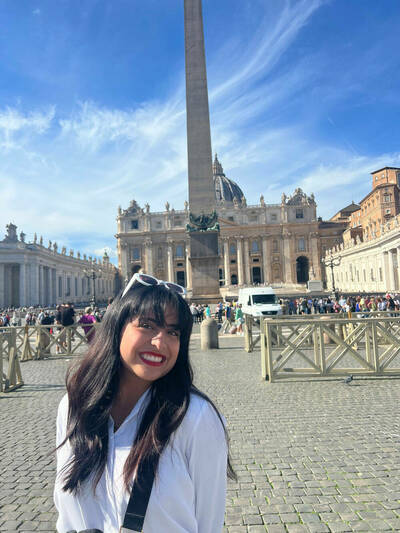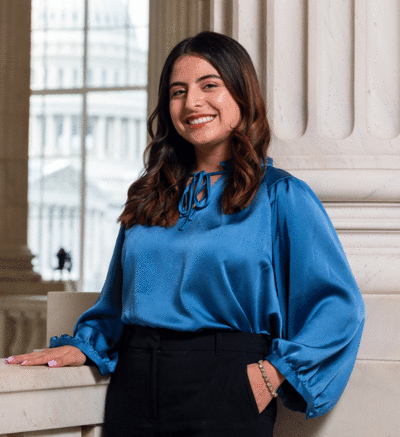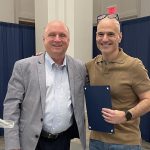Irasema Hernandez Trujillo ’24 is a junior from Benito Juarez, Michoacán, Mexico. Her interest in gendered migration and the educational empowerment of migrant youth helped lead her to major in global affairs at Notre Dame. Below, Irasema talks about why she chose the major in addition to a primary major of political science; her favorite class; her research in Rome; and more.
Why did you choose to major in global affairs at Notre Dame?
Originally, I am from Benito Juarez, Michoacán, Mexico. Our water supply was scarce and rarely clean. Our so-called “protectors” were imposters clothed in uniforms and badges, but they did nothing to stop the violence overtaking our streets. A small clinic, a local church, a Sunday open-air market, and a schoolhouse were the only amenities in town. My town struggled to provide quality education and a safe place for children to grow, learn, and prosper.
Due to these disparities, I am interested in gendered migration and educational empowerment among migrant youth worldwide. During my first semester at Notre Dame I took Introduction to Global Affairs and Integral Human Development with Professor Diane Desierto. In this course we looked at development through the lenses of individuals, communities, groups, and populations. Because of the meaningful discussions in class, weekly reflective journals, and research assignments that focused on the integral human development of all individuals (regardless of socioeconomic status, race, and immigration status), I fell in love with the class and decided to add it as my major.
Were you always interested in topics related to global affairs?
I always knew I wanted to study something in the realm of migration, gender, and education. However, it was only after taking Introduction to Global Affairs that I learned about the importance of advocating for the universal right of all individuals; that I cemented my interest in civil and human rights.
What has been your favorite class in the program and why?
My favorite class in the program has been Human Rights Reparations: Design and Compliance, taught by ProfessorAnibal Perez-Linan, who also is the director of the Keough School’s Kellogg Institute for International Studies. In this course we analyzed the factors that lead states to comply with international court orders. Through advanced methodological tools such as R Studio, we analyzed and predicted compliance and participated in research projects integrated into the Notre Dame Reparations Design and Compliance Lab (NDRL). I was the only sophomore in a class full of masters, law, and doctoral students and was able to connect with like-minded young professionals dedicated to ensuring the betterment of underserved communities worldwide.
Have you conducted any related research or independent study?
During Notre Dame’s weeklong fall break I conducted research in Rome, Italy through an undergraduate grant from the Keough School’s Nanovic Institute for European Studies. I met with the leaders of immigrant rights nongovernmental organizations, professors, and priests to discuss how the rhetoric around immigration policy affects the construction of race and immigration laws in modern-day Italy. This experience cemented my passion for migration and displacement in Latin America and the Euro-Mediterranean region. Next spring I will study abroad in Morocco as part of my global affairs study and will research migration patterns among women and children.

What makes the global affairs program at Notre Dame stand out among similar programs at other schools?
The global affairs program at Notre Dame challenges, equips, and mobilizes students to be future policymakers and advocates. It provides students with an interdisciplinary tool kit to implement integral human rights developments worldwide. Through the language and cross-cultural requirements, students gain professional and global experience by facing and experiencing the issues firsthand. Through the faculty network, with an incredibly diverse pool of leading advocates from all sectors related to both the public and private sectors, students receive perspective and mentorship from the best. Finally, the courses in the program are interdisciplinary with real-world interactive settings that introduce students to the policy-making process and international arena in a meaningful and collaborative manner.
Do you have any advice for prospective students who are considering a major in global affairs?
If you are interested in learning how to be a globally minded individual with a tool kit to advance the lives of many underserved communities worldwide, this is the program for you! You will gain the knowledge, skills, and mentors to be a renowned change-maker for human rights.
What are your career plans/post-graduation plans?
I plan to pursue a Fulbright award to work in a Latin American country where I can continue researching gendered migration while also educating and empowering youth to learn English. After completing the program, I plan to attend law school to become a civil rights lawyer. I hope to start my private practice in a firm that specializes in advancing the lives of migrants while also providing accessible legal counsel to vulnerable migrant youth searching for a better life worldwide.
Originally published at admissions.nd.edu on November 15, 2022.



